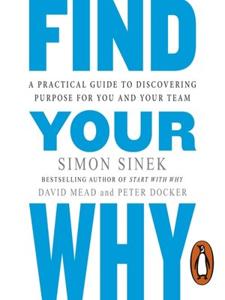
Want to learn the ideas in Find Your Why better than ever? Read the world’s #1 book summary of Find Your Why by Simon Sinek here.
Read a brief 1-Page Summary or watch video summaries curated by our expert team. Note: this book guide is not affiliated with or endorsed by the publisher or author, and we always encourage you to purchase and read the full book.
Video Summaries of Find Your Why
We’ve scoured the Internet for the very best videos on Find Your Why, from high-quality videos summaries to interviews or commentary by Simon Sinek.
1-Page Summary of Find Your Why
Overview
Do you know why you get up in the morning and go to work? Do you have a sense of direction and purpose for your personal or professional life?
If you can’t answer the question “Why do I do what I do?” then you are not satisfied with your job. You won’t feel fulfilled, and it will be hard to get up in the morning. This article shows how to discover your WHY so that you’ll wake up inspired every day. It includes stories from people’s pasts, as well as exercises for figuring out your own personal WHY. You’ll also learn about specificity during this process by sharing a story about someone else’s life; why small talk is more interesting when you know someone’s WHY; and how actions bring meaning to the things we say we care about.
Big Idea #1: Knowing your WHY means having a clear purpose, and this makes you and your business more appealing.
If you’ve ever been lost or unfulfilled in life, it might be because you don’t know your purpose. The author Simon Sinek calls this knowing your “why”. It can be hard to find your why, but once you do, you’ll feel more fulfilled and have a sense of purpose every morning when you wake up. After the author was feeling depressed about his work, he realized that his why was to inspire others. Once he took action based on this idea, he felt better about himself and saw things more clearly.
When Simon Sinek knew his WHY, he found that it gave him direction and confidence. This is true for both people and companies; for example, Apple’s customers are loyal because they’re inspired by their motto “Think Different.” Customers would rather give money to a business with a progressive identity than save a few bucks buying from a more generic company.
The purpose of advertising is to get people’s attention and interest. Let’s look at two different advertisements that use a strong purpose:
The first pitch emphasizes the quality and price of the paper, while the second pitch focuses on how the company is trying to create a high-quality product that allows people to spread their ideas. The second pitch is more effective because it explains why they do what they do.
Sometimes we need to advertise ourselves and our talents, especially when applying for a job. Emily had that opportunity and she was able to share her WHY with the panel of executives who were interviewing her.
Emily got the job because she knew her WHY.
Big Idea #2: Unlock your WHY by looking to your past.
If you hate your job and find it exhausting, then you’re doing something that doesn’t speak to your WHY. Once you find a job that’s in line with what makes you tick, even the most tedious tasks become easy to tackle. A great way to figure out what that is is by working through Simon Sinek’s golden circle. The golden circle was introduced in his previous book Start With Why, which illustrates how we tend to operate on three levels: WHAT we do (outer ring), HOW we do it (middle ring), and WHY we do it (inner ring).
When you have all of these areas in balance, then you will find that you are passionate about your work.
The author met a man named Steve who had been working at his job for 23 years. He was still excited by it, even though he did something that many people would find boring and uninspiring—he manufactured steel. But he made it exciting by producing a pure product that is easier to recycle and creates less pollution. And the reason he does this is because of his passion for keeping the environment clean for future generations.
Steve’s WHY has kept him energized and passionate for over two decades, but if you’re still wondering how to find your WHY, try looking into your past. In helping one young woman identify her WHY, the authors performed a discovery exercise that involved the woman sharing personal stories from her past. This revealed painful information about why she wanted to protect vulnerable people who couldn’t protect themselves.





